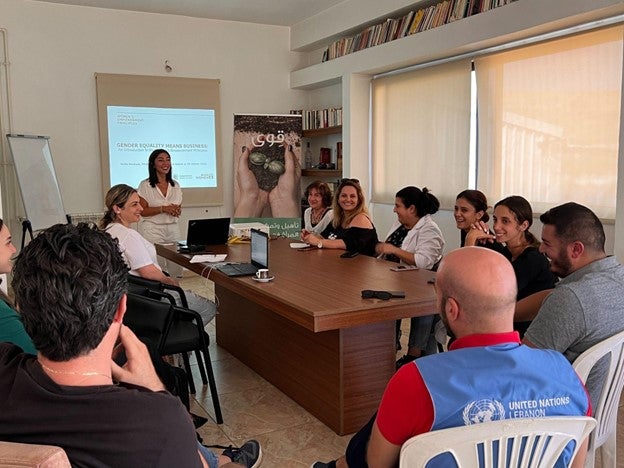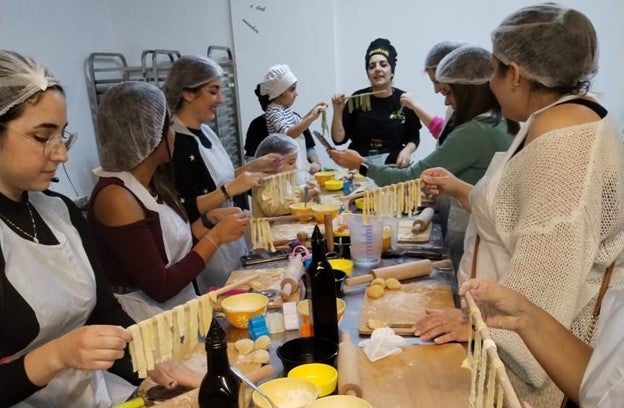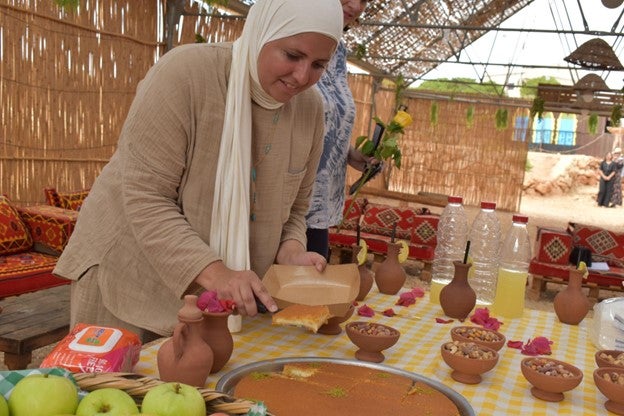Women businesses in Lebanon pave the way towards a more equal and inclusive economy
Date:

UN Women and the Lebanese League for Women in Businesses conducting WEPs training with Msallem Food Tech in Aabdeh, Lebanon. Photo: UN Women/Nour Abdul Reda.
In the pursuit of advancing gender equality and women’s empowerment, businesses worldwide are turning to the Women's Empowerment Principles (WEPs), a set of guidelines developed by UN Women and UN Global Compact (UNCG). Rooted in international labour and human rights standards, the WEPs guide businesses on fostering gender equality in the workplace, marketplace and community.
Under the Productive Sector Development Programme (PSDP), funded by the Government of Canada, UN Women and the Lebanese League for Women in Businesses (LLWB) have supported 26 businesses in signing the WEPs. Notably, this collaboration has led to the recruitment of at least 32 new women in these businesses, and 34 per cent of these women have disabilities. Two women CEOs, Leila Khalifeh from Gudtolli and Salma Khawla from Bustan Salma, share their insights on how integrating the WEPs into their businesses has contributed to their success.
Fresh from the farm to the table

Gudtolli staff preparing pasta made from freshly harvested vegetables. Photo: UN Women/Leila Khalifeh.
Established in 2020, Gudtolli is a women-owned Lebanese business producing pasta made from fresh vegetables, among other cuisine. Despite facing a decline in income compared to 2022, Gudtolli has flourished through strategic decisions, including the recruitment of women.
Khalifeh highlights the pivotal role women have played in propelling the business forward, providing stability and fostering diversity and inclusivity: “Joining the WEPs has further amplified our success by opening avenues for growth and collaboration. Access to resources, networks and mentorship programmes has empowered female team members, resulting in improved business performance.”
The commitment to women's empowerment has not only enhanced the company culture but also positioned Gudtolli as a socially responsible and progressive entity, attracting top talent and strengthening relationships with stakeholders who share similar values.
“The impact of empowering women in our workforce goes beyond just financial stability. It has created a positive ripple effect within our company culture, inspiring other team members to embrace diversity and inclusion,” says Khalifeh.
Farming with an educational twist

Salma Khawla serving homemade food at Bustan Salma, a women-owned organic farm in Koura, Lebanon. Photo: UN Women/Nour Abdul Reda.
Located in Koura, 81.7 km away from Beirut, Bustan Salma (Salma’s farm) is an organic farm that teaches children how to conduct day-to-day farming, including plowing, harvesting, caring for livestock, and making pasta and other food. The farm is owned by Salma Khawla, an ambitious Lebanese woman who has learned everything about farming from her father since she was young.
By inclusively incorporating more women into their team, Bustan Salma has harnessed a diverse set of skills and perspectives, significantly enhancing the farm’s effectiveness and success.
“The inclusion of women has spurred creativity, problem-solving and increased innovation,” she says. “Being a part of the WEPs has reinforced a workplace culture that promotes gender equality, contributing to overall business performance, sustainability and long-term success.”
Khawla continues: “The international business support programme embedded in the WEPs framework has further provided invaluable assistance in fostering a workplace that empowers women, aligning with our commitment to create lasting impact.”
Gudtolli and Bustan Salma are two of the over 40 businesses that UN Women has supported over the years to sign the WEPs through trainings, business development and achievable action plans. As these businesses continue to thrive, they not only contribute to the success of the WEPs, but also champion a more equitable and empowered global society.
The WEPs component is part of a larger project under the UN Productive Sector Development Programme (PSDP), made possible through generous funding from the Government of Canada and implemented by six United Nations entities, namely: the Food and Agriculture Organization (FAO), International Labour Organization (ILO), United Nations Development Programme (UNDP), United Nations Children’s Fund (UNICEF), United Nations Industrial Development Organization (UNIDO), and UN Women. The primary objective of this programme is to support gender-responsive job creation and to create economic opportunities in the agricultural and agrifood sectors in Lebanon.